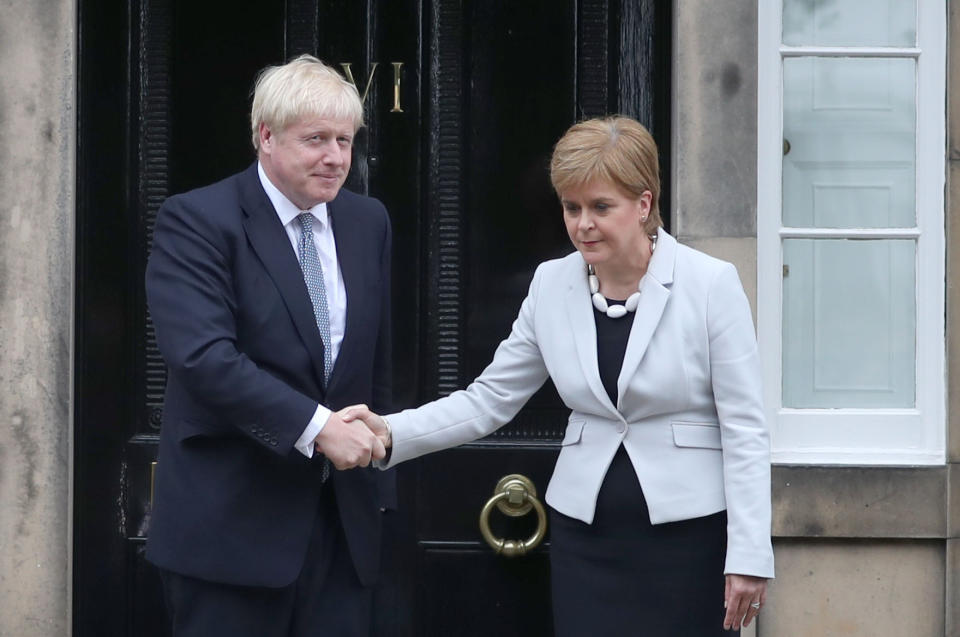Prime Minister urged to hold quarterly meetings with devolved leaders
The Prime Minister should hold at least four meetings each year with the leaders of the devolved administrations in Scotland, Wales and Northern Ireland, a think tank has suggested.
Our Scottish Future made the plea as a report examining how the different governments had worked together during the coronavirus pandemic commented on the “seemingly dire personal relationship” between Boris Johnson and Scottish First Minister Nicola Sturgeon.
The paper, based on interviews with senior figures in both the London and Edinburgh governments, argued the close working relationships that have now been built up between health ministers across the UK need to be replicated and become a permanent feature of politics.
It insisted a “fundamental review of relations” is needed in an attempt to “examine the root causes which lay behind the failure to co-operate during the Covid crisis”.

The think tank found the “absence of communication between the UK Government and the devolved administrations reduced the opportunity for effective engagement between the centre and the nations and regions”.
It stated: “Good crisis management relies entirely on clear lines of reporting, forums for collaboration and good information-sharing so that, even when stakeholders have different views, those differences of opinion can be aired and resolved speedily.
“This was missing entirely during a crucial part of the pandemic response – the period we had to ‘get our act together’ before an inevitable second wave.”
While governments across the UK were working to tackle the spread of the virus, the think tank said UK officials complained about the Scottish Government’s “refusal to accept that co-operation was a ‘two way street'”.
One said: “In our case, officials from the devolved administrations were always invited to key meetings but never once were our own officials allowed into theirs.”
As a result of this, “Downing Street appears to have decided to pull up the drawbridge completely”, the report added.
There was a further “low point” in relations in July, when the Scottish and Welsh Governments criticised the quarantine arrangements put in place for travellers coming to the UK from overseas.
And in September, Welsh First Minister Mark Drakeford revealed he had not had a phone call from Mr Johnson for four months – with the Labour politician branding this “simply unacceptable”.

Professor David Kerr, a cancer expert at the University of Oxford and chairman of Our Scottish Future’s Health Commission, was clear that the pandemic “too often witnessed a deficit of co-operation and co-ordination between the UK and Scottish Governments, which only risked potential damage to our response to the disease”.
Regarding this “failure to co-operate” by the different governments, the report said this could be attributed, in part, to political differences between the Tory regime at Westminster and the SNP one at Holyrood.
It added that it could also be “laid at the door of the seemingly dire personal relationship between the Prime Minister and First Minister, and an SNP Government which has no great political incentive to show that the Union can be made to work.”
In the wake of the pandemic the think tank concluded that the UK Government and the devolved administrations now need to “reconstruct their relationships from first principle”.
As well as recommending that Mr Johnson holds meetings with the First Ministers of Scotland, Wales and Northern Ireland on a quarterly basis, it called for the creation of “permanent, formalised and open lines of co-operation” between the governments on shared health challenges.
This could help “develop joined-up policy areas” and also provide a setting where experts could share their knowledge with both Westminster and the devolved governments.
Report authors Eddie Barnes and Evie Robertson said: “Ministers and officials from across the UK were faced with an unprecedented emergency in March 2020 and, at their best, they performed heroically in search of common solutions.
“This was exemplified by the way the various NHS agencies across the UK mobilised at speed to prepare for the first wave, and by the remarkable vaccine effort earlier this year, when genuine collaboration and co-operation supported a national effort to protect thousands of lives.”
But they added that, at other moments, “relatively minor differences in emphasis and presentation between key politicians across the UK led to a breakdown in effective engagement between the centre and the nations of the UK, potentially putting public safety at risk”.
The authors said: “If we are to learn the lessons of the pandemic, avoid political turf wars, and create a truly co-operative Union, then a more formalised working relationship between the UK Government and the devolved administrations should be mapped out with urgency.
“This will not just support better governance of the next health crisis to hit the UK but will also deliver better government across the United Kingdom in every area of public policy.”
A Scottish Government spokesman said: “While health is a wholly devolved policy area, and must remain so, throughout the pandemic we have worked as closely as possible with the UK Government and with the other devolved nations to keep people safe and suppress the virus.
“As the Chief Medical Officer (Gregor Smith) made clear yesterday, he and senior colleagues remain in close touch with their clinical counterparts across the four nations.
“In addition, the Health Secretary (Humza Yousaf) remains in contact with UK and devolved nations health ministers when necessary.”
A UK Government spokesman said: “We have faced the pandemic as one United Kingdom, working together with the devolved administrations to support jobs, back public services and deliver our hugely successful UK-wide vaccine rollout programme.
“There is already regular communication between all levels of the UK Government and the devolved administrations, and we want to build on that meaningful engagement as we focus on our collective recovery; from getting people back into jobs, tackling NHS backlogs, and catching up pupils on lost school hours.”

 Yahoo News
Yahoo News 